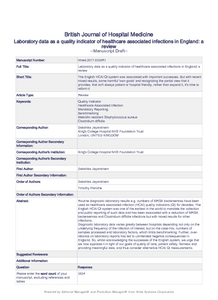Jeyaratnam, D; Planche, T
(2018)
Laboratory data as a quality indicator of health-care-associated infections in England.
Br J Hosp Med (Lond), 79 (6).
pp. 333-340.
ISSN 1750-8460
https://doi.org/10.12968/hmed.2018.79.6.333
SGUL Authors: Planche, Timothy David
![[img]](https://openaccess.sgul.ac.uk/109906/7.hassmallThumbnailVersion/Submitted_revision_BJHM_April27th2018.pdf)  Preview |
|
PDF
Accepted Version
Available under License ["licenses_description_publisher" not defined].
Download (2MB)
| Preview
|
Abstract
Routine diagnostic laboratory results, e.g. numbers of meticillin-resistant Staphylococcus aureus (MRSA) bacteraemias, have been used as health-care-associated infection quality indicators for decades. The English health-care-associated infection quality indicator system was one of the earliest in the world to mandate the collection and public reporting of such data and has been associated with a reduction of MRSA bacteraemias and Clostridium difficile infections but has shown mixed results for other infections. Diagnostic laboratory data vary greatly between hospitals depending not only on the underlying frequency of the infection of interest, but on the case mix, numbers of samples processed and laboratory factors, which limits benchmarking. Further, over-reliance on laboratory reports has led to unintended negative consequences in England. So, while acknowledging the successes of the English system, the authors believe that it should be appraised in light of the goals of quality of care, patient safety, fairness and providing meaningful data, and alternative healthcare-associated infection quality indicator measurements considered.
Statistics
Item downloaded times since 31 Jul 2018.
Actions (login required)
 |
Edit Item |



